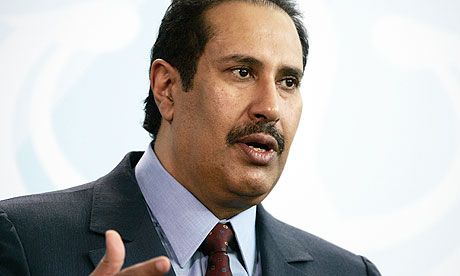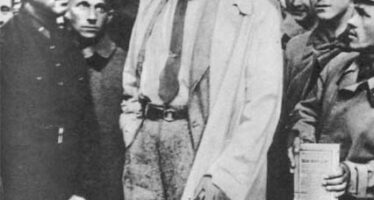WikiLeaks cables claim al-Jazeera changed coverage to suit Qatari foreign policy
![]()
US embassy memos flatly contradict Arabic satellite channel’s insistence that it is editorially independent despite being heavily subsidised by Gulf state
Robert Booth

Qatar is using the Arabic news channel al-Jazeera as a bargaining chip in foreign policy negotiations by adapting its coverage to suit other foreign leaders and offering to cease critical transmissions in exchange for major concessions, US embassy cables released by WikiLeaks claim.
The memos flatly contradict al-Jazeera’s insistence that it is editorially independent despite being heavily subsidised by the Gulf state.
They will also be intensely embarrassing to Qatar, which last week controversially won the right to host the 2022 World Cup after presenting itself as the most open and modern Middle Eastern state.
In the past, the emir of Qatar has publicly refused US requests to use his influence to temper al-Jazeera’s reporting.
But a cable written in November 2009 predicted that the station could be used “as a bargaining tool to repair relationships with other countries, particularly those soured by al-Jazeera’s broadcasts, including the United States” over the next three years.
Doha-based al-Jazeera was launched in 1996 and has become the most watched satellite television station in the Middle East.
It has been seen by many as relatively free and open in its coverage of the region, but government control over its reporting appears to US diplomats to be so direct that they said the channel’s output had become “part of our bilateral discussions – as it has been to favourable effect between Qatar and Saudi Arabia, Jordan, Syria and other countries”.
In February, the US embassy reported to Washington how “relations [between Qatar and Saudi Arabia] are generally improving after Qatar toned down criticism of the Saudi royal family on al-Jazeera”.
In June 2009, the US embassy concluded that the channel “has proved itself a useful tool for the station’s political masters”.
However, US allegations of manipulation of al-Jazeera’s content for political ends appear to contradict the Qatari stance of supporting a free press.
“The Qatari government claims to champion press freedom elsewhere, but generally does not tolerate it at home,” the US embassy said after the French director of the Doha Centre for Media Freedom resigned in June 2009, citing restrictions on the centre’s freedom to operate.
In a clear example of the regional news channel being exploited for political ends, the Doha embassy claimed Qatar’s prime minister, Sheikh Hamad bin Jassim al-Thani (HBJ), told the US senator John Kerry that he had proposed a bargain with the Egyptian president, Hosni Mubarak, which involved stopping broadcasts in Egypt in exchange for a change in Cairo’s position on Israel-Palestinian negotiations.
“HBJ had told Mubarak ‘we would stop al-Jazeera for a year’ if he agreed in that span of time to deliver a lasting settlement for the Palestinians,” according to a confidential cable from the US embassy in Doha in February. “Mubarak said nothing in response, according to HBJ.”
The US has benefitted, too. “Anecdotal evidence suggests, and former al-Jazeera board members have affirmed, that the United States has been portrayed more positively since the advent of the Obama administration,” a cable in November 2009 said.
“We expect that trend to continue and to further develop as US-Qatari relations improve.”
In 2001 the emir, Hamad bin Khalifa al-Thani, refused a US request to stop al-Jazeera giving so much airtime to Osama bin Laden and other anti-American figures, saying: “Parliamentary life requires you to have a free and credible media, and that is what we are trying to do.
“Al-Jazeera is one of the most widely watched [television stations] in the Arab world because of its editorial independence.”
The Gulf state has frequently held up al-Jazeera as evidence of its relative openness. The independent Visit Qatar website states: “What makes al-Jazeera such a unique channel in the Middle East is its editorial independence.
“This has been seen by many as evidence that Qatar is one of the region’s more liberal and democratic countries, and one which provides freedom of press and speech.”
Qatar maintains a working relationship with Iran, and the US embassy was concerned by the lack of al-Jazeera coverage of the civil unrest in Iran after the disputed presidential election in the summer of 2009.
“Al-Jazeera’s coverage of the Iranian election and its aftermath has been scanty by comparison to other hot topics in the region, such as Gaza,” the embassy reported at the time.
Al-Jazeera “has proved itself a useful tool for the station’s political masters”, the cables said.
Local media are also affected by government interference. “Over the past three [visits] we have assessed as steady the lack of overall media freedom in Qatar,” the November cable said.
“Although overt and official censorship is not present, self and discreet official censorship continue to render Qatari domestic media tame and ineffective.”
The embassy of Qatar in London declined to comment on the story tonight. Attempts to reach al-Jazeera for comment failed.
Related Articles
Un artista para el pueblo “Pantera Negra: el arte revolucionario de Emory Douglas”
![]()
México, novedad editorial Regeneración Radio Southern trees bear strange fruit,Blood on the leaves and blood at the root,Black bodies swinging
Carolina Zamudio: “Escribo, para unir piezas rotas y intentar recomponer el caos”
![]()
La poetisa italiana Anna Lombardo nos ofrece una entrevista con la poetisa argentina Carolina Zamudio
ON A DAY THIS WEEK, in April, 1930
![]()
The 14th April 1930, Leningrad’s Krasnaya Gazeta (The Red Gazette) reported that Soviet “poet-tribune” Vladimir (Volodya) Mayakovsky, had committed suicide by shooting himself through the heart




